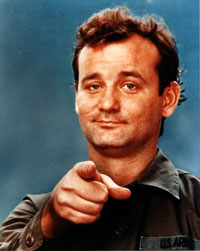Celebrating an American comic hero
Published on Tue, Aug 10, 2010 by Bob ConnallyRead More Arts & Entertainment
 This issue, instead of slogging through rubbish new releases, I will be celebrating the work of one of the greatest people in the history of the planet.
This issue, instead of slogging through rubbish new releases, I will be celebrating the work of one of the greatest people in the history of the planet. Despite decades of British comic supremacy, this man makes you proud to be an American. If there were a Mount Rushmore of American Comedy, his face would be carved alongside likenesses of Buster Keaton, Bob Hope, Groucho, Harpo and Chico. That face belongs to a man who's been properly described as a "national treasure." He turns 60 next month and, unlike seemingly every other alum of "Saturday Night Live," he improves with age.
He is the one and only Bill Murray.
The Wilmette, Illinois, native first rose to prominence as a cast member on "SNL," at the time an unpopular replacement for Chevy Chase. Yes. People liked Chevy Chase more than Bill Murray. I wasn't around for the '70s, but it sounds like another planet. But by the time he'd sung a lounge version of the theme to "Star Wars," the Great One was accepted and there was no stopping him.
With the release of his latest film, "Get Low," as an excuse, I will take a look at some of Murray's best work in film over the past 30 years.
I'll begin with his breakout film role in 1980's "Caddyshack" (R). Directed by regular Murray collaborator Harold Ramis, this golfing comedy isn't terribly interested in telling the story of young caddy Danny Noonan (Michael O'Keefe) and is really more of an excuse to put Murray, Chase, and Rodney Dangerfield all in the same movie. Murray's finest moments in "Caddyshack" involve golfing flowers while sportscasting and of course, the "Llama Story." As great as Murray is throughout the film, "Caddyshack's" Green Jacket belongs to the underrated Ted Knight.
Not to be outdone for the next three decades, however, Murray saves 1981's "Stripes" (R) from being a forgettable comedy. The story of two slackers (Murray and Ramis) who decide to join the Army would have slipped into almost instant obscurity without Murray doing what the young Bill Murray did best, which was be a Grade A wisenheimer.
 With his greatness now indisputable, Murray would cement his place in comedy and cinematic history with 1984's "Ghostbusters" (PG). Writers Ramis and Dan Aykroyd tailor-made the role of Peter Venkman for Murray. The result was a Golden Globe-nominated performance, a license to print money, and Bill Murray achieving icon status. More than 25 years later, the Ivan Reitman-directed film holds up very well, thanks to an outstanding screenplay and terrific performances all around.
With his greatness now indisputable, Murray would cement his place in comedy and cinematic history with 1984's "Ghostbusters" (PG). Writers Ramis and Dan Aykroyd tailor-made the role of Peter Venkman for Murray. The result was a Golden Globe-nominated performance, a license to print money, and Bill Murray achieving icon status. More than 25 years later, the Ivan Reitman-directed film holds up very well, thanks to an outstanding screenplay and terrific performances all around.1988's "Scrooged" (PG-13) and 1989's "Ghostbusters II" (PG) performed well at the box office and showcased Murray's comic prowess, but it was 1991's "What About Bob?" (PG) that showed another side of the funnyman. Instead of being the snarkiest and smartest guy in the room, his Bob Wiley is the sweetest, most sincere, and most irritating.
As a hypochondriac who innocently hijacks his psychiatrist's family vacation, Murray plays wonderfully off of Richard Dreyfuss as the psychiatrist who's losing his sanity.
For the first decade and a half of his career, Bill Murray had only ever really been allowed to be funny. And not just funny, but laugh-out-loud, easily accessible funny. While no one was better at this, it also meant that more dramatic movies close to his heart, such as 1980's "Where the Buffalo Roam" (R) and 1984's "The Razor's Edge" (R), were widely rejected.
His small but memorable role in Tim Burton's finest work, 1994's "Ed Wood" (R), was an important step in Murray reinventing himself and aging gracefully, something fellow "SNL" alums Aykroyd, Eddie Murphy, and Mike Myers (among others) have failed to do. As one of Wood's (Johnny Depp) closest friends, Murray is very funny but clearly and unabashedly stepping away from what made him a star. Still, there's the sense that only Murray could do that part justice--the sort of casting that only seems obvious after you've seen the finished product.
"Old school" Murray appeared again to say goodbye with another small but memorable role in 1996's "Kingpin" (PG-13). As bowling legend Ernie McCracken, Murray infuses Peter Venkman's cockiness with a sense of massive self-importance bordering on delusion. The incredible flair he brings to the performance makes you wonder if he knew this would be the last time he'd ever play a character like that. His next notable role would show that a new Bill Murray had arrived and was there to stay.
1998's "Rushmore" (R) is not just my favorite Bill Murray movie, it's one of my top five favorite movies, period. There's a depth and pain to his performance as bitter billionaire Herman Blume that we'd glimpsed in "Groundhog Day," but it's fully realized here. Murray is brilliantly funny, but he does it here by not actually going for the comedy. Unlike Peter Venkman, Herman has no idea he's funny.
 He would continue to display his range as an actor in his Oscar-nominated performance in 2003's "Lost in Translation" (R). As an actor known for spouting so many quotable lines throughout the years, it's ironic that Murray's most memorable moment in the film is an inaudible whisper into Scarlett Johansson's ear.
He would continue to display his range as an actor in his Oscar-nominated performance in 2003's "Lost in Translation" (R). As an actor known for spouting so many quotable lines throughout the years, it's ironic that Murray's most memorable moment in the film is an inaudible whisper into Scarlett Johansson's ear.With "The Life Aquatic with Steve Zissou" (R) and "Broken Flowers" (R), Bill Murray showed that embracing one's age and experiences is good for an actor. It seems that few primarily comic actors have grasped this, and since this feat is so unusual, it raises a question. Will following Bill Murray's example save and enrich future careers in film comedy or is the man's continued success simply due to his innate Bill Murrayness? Only time will tell.
Finally, I'd be remiss if I didn't mention his brief appearance in 1996's "Space Jam" (PG) if only because it's the only screen pairing of Murray and Daffy Duck. The mere fact that the universe didn't collapse on itself due to an overload of "too much awesomeness" baffles scientists to this day.
Bob Connally loves movies. If you'd like to send Bob a comment or suggestion, e-mail [email protected].


